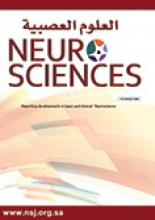Abstract
OBJECTIVE: To screen and evaluate the significance of anticardiolipin seroprevalence in patients with acute ischemic stroke, in patients with infectious disease, and in healthy subjects resident in Sudan, a tropical country endemic for several infectious diseases.
METHODS: We conducted the study in Khartoum Teaching Hospital in Khartoum, Sudan between July 2003 and January 2005. We included 89 stroke cases, 30 infectious disease patients, and 30 asymptomatic healthy subjects. We estimated IgG and IgM anticardiolipin antibody titers in serum samples from all subjects in the 3 study categories at the time of hospital admission.
RESULTS: We found a significantly higher prevalence of anticardiolipin antibodies in the stroke and infection groups compared to the healthy subjects. However, there was no significant difference in anticardiolipin seroprevalence between patients with stroke and patients with infectious disease.
CONCLUSION: Caution is necessary when interpreting the presence of antiphospholipid antibodies as a stroke risk in patients harboring infection or living in places with high endemicity of infectious diseases.
- Copyright: © Neurosciences
Neurosciences is an Open Access journal and articles published are distributed under the terms of the Creative Commons Attribution-NonCommercial License (CC BY-NC). Readers may copy, distribute, and display the work for non-commercial purposes with the proper citation of the original work.






